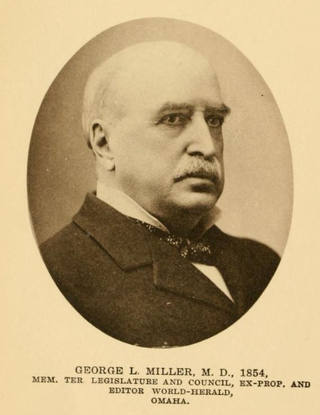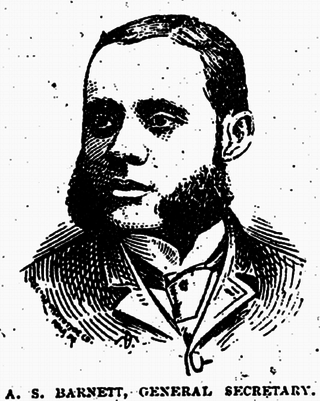Related Research Articles
The civil rights movement in Omaha, Nebraska, has roots that extend back until at least 1912. With a history of racial tension that starts before the founding of the city, Omaha has been the home of numerous overt efforts related to securing civil rights for African Americans since at least the 1870s.
African Americans in Omaha, Nebraska are central to the development and growth of the 43rd largest city in the United States. The first free black settler in the city arrived in 1854, the year the city was incorporated. In 1894 black residents of Omaha organized the first fair in the United States for African-American exhibitors and attendees. The 2000 US Census recorded 51,910 African Americans as living in Omaha. In the 19th century, the growing city of Omaha attracted ambitious people making new lives, such as Dr. Matthew Ricketts and Silas Robbins. Dr. Ricketts was the first African American to graduate from a Nebraska college or university. Silas Robbins was the first African American to be admitted to the bar in Nebraska. In 1892 Dr. Ricketts was also the first African American to be elected to the Nebraska State Legislature. Ernie Chambers, an African-American barber from North Omaha's 11th District, became the longest serving state senator in Nebraska history in 2005 after serving in the unicameral for more than 35 years.

George Lorin Miller (1830–1920) was an American pioneer physician, editor, politician, and land owner in Omaha, Nebraska. The founder of the Omaha Herald, which later became part of the Omaha World-Herald, Miller arrived in Omaha in 1854, the year the city was founded. He also promoted Omaha as the route of the First transcontinental railroad and the Trans-Mississippi and International Exposition in Omaha in 1898.
Johnny Owen was an American Democratic politician and a member of the Nebraska House of Representatives representing Omaha. After serving in the legislature, Owen was an advocate for civil rights and was known as the "Negro mayor of Omaha".
Millard Filmore Singleton was an early black political leader and civil servant in Omaha Nebraska. He was an officer in the Omaha Colored Republican Club and the Omaha branch of the National Afro-American League. He held posts as Justice of the Peace, storekeeper in the United States Internal Revenue Service, recorder of deeds for the city, and as bailiff of the municipal court.
John Albert Williams was a minister, journalist, and political activist in Omaha, Nebraska. He was born to an escaped slave and spoke from the pulpit and the newspapers on issues of civil rights, equality, and racial harmony. He was a highly respected minister, journalist, and civic leader. He served on many committees and boards among Omaha's black community and in the Omaha and Nebraska Episcopal Church.

Daniel F. Desdunes was a civil rights activist and musician in New Orleans and Omaha, Nebraska.
Lucinda (Lucy) Anneford W. Gamble or Gambol was a teacher and civic leader in Omaha, Nebraska. She was the Omaha Public Schools' first black teacher, teaching at Dodge School and Cass School from 1895 to 1901.
Thomas P. Mahammitt was a journalist, caterer, civil rights activist, and civic leader from Omaha Nebraska. He was owner and editor for the black weekly, The Enterprise, Omaha's leading black paper at the turn of the 20th century. He was also an active leader in the Masons and the Boy Scouts and was named "Omaha's most distinguished Negro citizen" in 1934.

Ella Lillian Davis Browne Mahammitt was an American journalist, civil rights activist, and women's rights activist from Omaha, Nebraska. She was editor of the black weekly The Enterprise, president of Omaha's Colored Women's Club, and an officer of local branches of the Afro-American League. On a national stage, in 1895 she was vice-president of the National Federation of Afro-American Women, headed by Margaret James Murray, and in 1896 was a committee member of the successor organization, the National Association of Colored Women, under president Mary Church Terrell.

Edwin R. Overall aka Edwin R. Williams was an abolitionist, civil rights activist, civil servant, and politician in Chicago and Omaha. In the 1850s and 1860s, he was involved in abolition and underground railroad activities headed at Chicago's Quinn Chapel AME Church. During the U. S. Civil War, he recruited blacks in Chicago to join the Union Army. After the war, he moved to Omaha, where he was involved in the founding of the National Afro-American League and a local branch of the same. He was the first black in Nebraska to be nominated to the state legislature in 1890. He lost the election, but in 1892, his friend Matthew O. Ricketts became the first African-American elected to the Nebraska legislature. He was also a leader in Omaha organized labor.
Cyrus Dicks Bell was a journalist, civil rights activist, and civic leader in Omaha, Nebraska. He owned and edited the black newspaper Afro-American Sentinel during the 1890s. He was an outspoken political independent and later in his life became a strong supporter of Democrats. He was a founding member of the state Afro-American League and frequently spoke out against lynchings and about other issues of civil rights.

Alfred S. Barnett was an American journalist and civil rights activist in Omaha, Nebraska, Des Moines, Iowa, and Chicago, Illinois. In Des Moines, Barnett created and ran the newspaper, The Weekly Avalanche from 1891 to 1894. Before moving to Des Moines, he contributed to his brother, Ferdinand L. Barnett's Omaha paper, The Progress. He worked for civil rights also a member and an officer of numerous civil rights organizations, including the Nebraska branch of the National Afro-American League and the Afro-American Protective Association of Iowa. Barnett was described as a "pleasing speaker".
George F. Franklin was a journalist and civic leader in Omaha, Nebraska, and Denver, Colorado. He owned and published two African-American newspapers, The Enterprise in Omaha and The Star in Denver. He was active in civil rights and was a member of the Nebraska branch of the National Afro-American League.

The history of African-Americans in Omaha in the 19th Century begins with "York", a slave belonging to William Clark of the Lewis and Clark Expedition who came through the area in 1804, before the city existed. African-Americans have lived in the Omaha area since at least 1819, when fur traders lived in the area.

Alphonso Wilson was an African-American activist in Omaha, Nebraska at the turn of the 20th century. Wilson was born in Bedford, Missouri in 1860. In 1880 he moved to Chicago and in 1886 he moved to Omaha. In Omaha he was a partner of the real estate firm Wilson & Bryant with James Bryant. In 1890 he was elected the Chairman of the Bureau of Immigration of the Nebraska branch of the National Afro-American League under president Matthew Ricketts. He also served as treasurer and a founding member of the Omaha Union League club, a social club and lyceum formed in 1895. In 1890, he was a member of a national building, loan, and protective union organized to assist Omaha blacks to buy or build a home. The local board of the group consisted of president George F. Franklin, vice president William Marshall, Secretary and Treasurer Alfred S. Barnett and Attorney James S. Bryant. The Board of Appraisers was Millard F. Singleton, Alphonso Wilson, and Harrison Buckner.
John Lewis was a hotel keeper, musician, and civil rights activist in Omaha, Nebraska. He was proprietor of the Lewis House in the early days of Omaha. In 1879, he organized a brass band which was a fixture in African-American events in Omaha in the 1880s. He was active in the Nebraska State Convention of Colored Americans, a part of the Colored Conventions Movement and involved in Republican politics in Omaha.
W. H. C. Stephenson was a doctor, preacher, and civil rights activist in Virginia City, Nevada, and Omaha, Nebraska. He was probably the first black doctor in Nevada and worked for the rights of blacks in that city. He was noted for his efforts in support of black suffrage in Nevada at the passing of the Fifteenth Amendment in 1870. He helped found the first Baptist church in Virginia City. He moved to Omaha in the late 1870s and continued his medical, religious, and civil rights work. He founded another Baptist church in Omaha, and was a prominent Republican and activist in the city.
Victor B. Walker was a soldier, political activist, lawyer, civil rights activist, police officer, saloon owner, journalist, and gangster in the Old West, particularly in Omaha, Nebraska, and in Denver, Colorado, at the end of the 19th and beginning of the 20th century. Before coming to Omaha, he was a Buffalo soldier on the frontier, and when he first arrived in the city, he worked as a police officer. For a short time, he owned the Omaha saloon, The Midway, a center of gambling and criminal activity in the city. As well as a working as defense lawyer, he worked for civil rights and was a member of the Omaha Afro-American League, a civil rights organization in the city.
Emmanuel S. Clenlans was a civil rights activist and postal worker in Omaha, Nebraska. Clenlans was born in about 1841 in Washington, DC. He married a woman named Ophelia and they had a daughter named Laura.
References
- ↑ Ex-Slaves Congress. Omaha World-Herald (Omaha, Nebraska). Wednesday, July 27, 1898. Volume: XXXIII Issue: 300 Page: 2
- ↑ November 27, 1938. "Mrs. John Albert Williams", American Life Histories: Manuscripts from the Federal Writers' Project, 1936–1940. U.S. Work Projects Administration, Federal Writers' Project (Folklore Project, Life Histories, 1936–39); Manuscript Division, Library of Congress. Retrieved from https://www.loc.gov/item/wpalh000834/ February 5, 2016.
- ↑ W. R. Gamble Dies at St. Paul. Omaha World-Herald (Omaha, Nebraska). Friday, April 22, 1910. Page: 14
- ↑ The Colored Men. A State Convention Held In Omaha Yesterday. The Proceedings--Officers Elected--Addresses. Daily Nebraska Press (Nebraska City, Nebraska). Wednesday, January 19, 1876. Page: 4
- ↑ Here and There. Brevities over the Wires from Various Places. Daily Inter Ocean (Chicago, Illinois). Wednesday, January 19, 1876. Volume: IV Issue: 257 Page: 5
- ↑ Nebraska Notes. Election Of Delegates To The National Convention. People's Advocate (Washington (DC), District of Columbia). Saturday, August 18, 1883. Page: 2
- ↑ A List of Delegates. Omaha World-Herald (Omaha, Nebraska). Wednesday, March 26, 1890. Page: 5
- ↑ War on "Ham" Barbers. Omaha World-Herald (Omaha, Nebraska). Wednesday, March 23, 1898. Page: 7
- ↑ State Society of Barbers. Omaha World-Herald (Omaha, Nebraska). Thursday, August 4, 1898. Page: 4